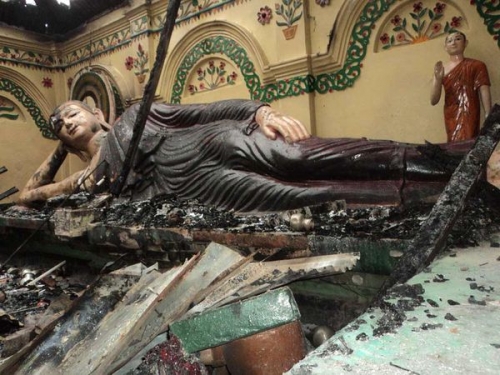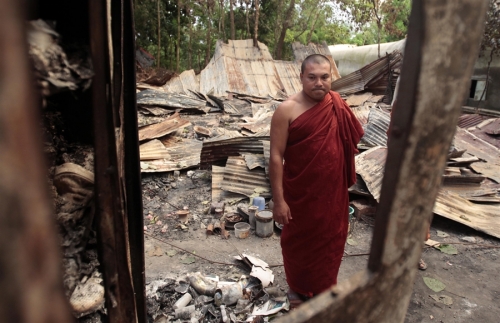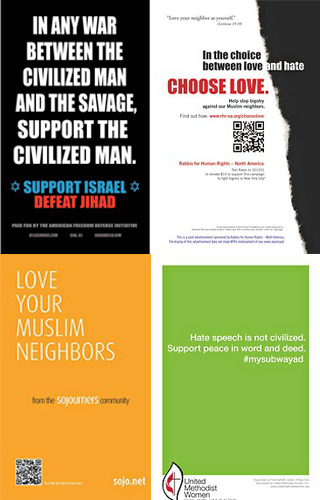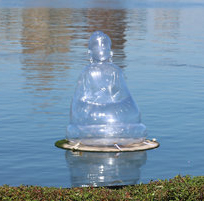It all started in a small phone repair shop in southeast Bangladesh last Saturday, when a Buddhist man in his twenties accidentally Facebook-tagged himself in a photo of a burned Koran. Others in the shop saw the photo, and the news spread around the Muslim community.
By Sunday, a mob had gathered, converging on the Buddhist villages in the area of Cox’s Bazar. Together they torched at least 10 Buddhist temples and burned and vandalized more than 100 Buddhist homes. The police had calmed the situation by dawn, but the damage had already been done.


On Wednesday, Buddhist monks in Bangkok protested in front of the United Nations office, demanding U.N. intervention to protect the Buddhist community, many of whom are now living in temporary shelters. The attacks came as a genuine surprise, as historically the Buddhist community in Bangladesh, which makes up less than 1% of the Muslim-majority population, has lived in harmony with their Muslim neighbors.
Speaking about living in harmony with our Muslim neighbors, yesterday three groups—Rabbis for Human Rights-North America, Sojourners (an interfaith social justice organization), and United Methodist Women—struck back against the anti-jihad advertisements that are currently hanging in NYC’s Times Square subway stations with advertisements of their own. They read, respectively, “In the choice between love and hate, choose love. Help stop bigotry against our Muslim neighbors,” “Love your Muslim neighbors,” and “Hate speech is not civilized. Support peace in word and deed.”
If you haven’t be en following this particular controversy, the American Freedom Defense Initiative posted ads two weeks ago that read, “In any war between the civilized man and the savage, support the civilized man. Support Israel. Defeat jihad,” sparking a slew of protests and debates about what free speech really means in the United States. (I should make it clear, by the way, that the American Freedom Defense Initiative had to successfully sue the MTA before the transit authority would allow them to post the ads.)
en following this particular controversy, the American Freedom Defense Initiative posted ads two weeks ago that read, “In any war between the civilized man and the savage, support the civilized man. Support Israel. Defeat jihad,” sparking a slew of protests and debates about what free speech really means in the United States. (I should make it clear, by the way, that the American Freedom Defense Initiative had to successfully sue the MTA before the transit authority would allow them to post the ads.)
At left, the original ad, the Rabbis for Human Rights ad, the Sojourners ad, and the United Methodist Women ad.

With the tragic events that unfolded in Bangladesh last weekend in mind, I was heartened to see this interfaith response of solidarity and peace in New York. As Sojourners’ campaign manager, Rev. Beau Underwood, was quoted in a New York Times article about the ads, “In the face of religious extremism, the best response is to treat others like we would want to be treated”—a sentiment I hope will be remembered in Bangladesh in the coming weeks.
In another, more kitschy story of interfaith interaction, a plastic inflatable Buddha statue called “Floating Echo” has been riding the waves of Socrates Sculpture Park in Queens for the last month. Isn’t he cute? The New York Times ran a story of his radiant equanimity last week.
Thank you for subscribing to Tricycle! As a nonprofit, we depend on readers like you to keep Buddhist teachings and practices widely available.